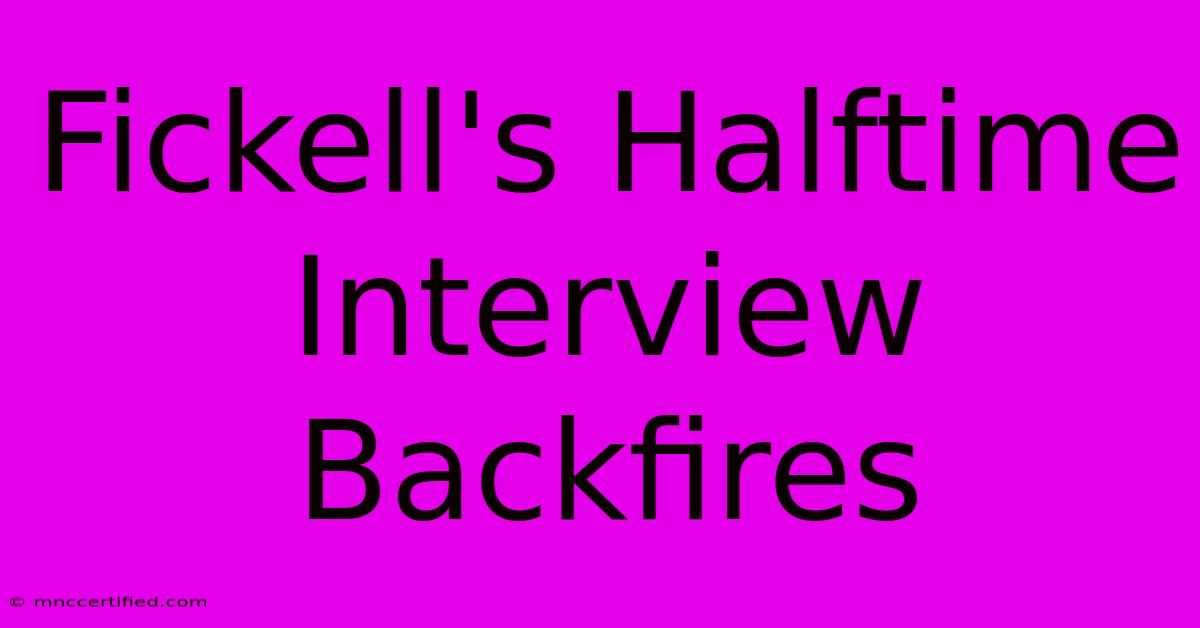Fickell's Halftime Interview Backfires

Table of Contents
Fickell's Halftime Interview Backfires: A PR Nightmare and Lessons Learned
Luke Fickell, the highly respected head coach of the Wisconsin Badgers, recently experienced a significant PR setback following a halftime interview during a game against Purdue. While intended to be motivational and insightful, the interview backfired spectacularly, generating considerable negative buzz online and raising questions about communication strategy and crisis management in college athletics. This article will dissect the incident, analyze the reasons behind its negative reception, and offer valuable lessons for coaches, athletic departments, and anyone involved in public relations.
The Interview: What Happened?
The specific details of the interview vary depending on the source, but the general consensus paints a picture of a frustrated Fickell expressing his disappointment with the team's performance. While the exact words remain subject to interpretation and varying accounts, the overall tone was perceived as critical, overly negative, and potentially demoralizing for his players. The interview, broadcast during halftime, was immediately met with a wave of reactions on social media, with many criticizing Fickell's public display of frustration.
The Criticism: Why the Backlash?
The negative response wasn't solely based on Fickell's perceived negativity. Several factors contributed to the interview's backfire:
- Public airing of internal issues: Criticizing players publicly, even constructively, is generally frowned upon. The halftime interview exposed internal team dynamics and potentially damaged player morale. This violated a fundamental principle of effective coaching: addressing concerns privately and maintaining team unity.
- Lack of strategic messaging: The interview lacked a clear, positive message. While intending to motivate, it came across as harsh and accusatory, failing to inspire confidence or instill hope. This highlights the importance of carefully crafting public statements, particularly during high-pressure situations.
- Poor timing: Conducting a critical interview during halftime, a crucial moment for strategic adjustments and team cohesion, was a tactical blunder. The timing amplified the negativity and undermined the opportunity for positive reinforcement and strategic re-evaluation.
- Social media amplification: The rapid dissemination of the interview via social media exacerbated the problem. The immediate and widespread criticism amplified the initial negative impact and prevented any damage control before it escalated.
Lessons Learned: Damage Control and Future Strategies
The Fickell incident serves as a valuable case study in crisis communication for coaches and athletic departments. Here are some key takeaways:
- Choose words carefully: Coaches must be mindful of their language and tone when speaking publicly, especially during emotionally charged moments. Consider the impact of every word and phrase.
- Prioritize private feedback: Address performance issues privately with players, fostering a constructive environment for improvement. Public criticism rarely achieves positive outcomes.
- Develop a crisis communication plan: Athletic departments should develop a comprehensive plan to address potential PR crises, including processes for handling media inquiries and managing social media narratives.
- Control the narrative: Actively engage in shaping the public narrative by providing context and clarifying any misunderstandings. This requires proactive communication and swift response to criticisms.
- Learn from mistakes: The incident should serve as a learning experience, prompting reflection on communication strategies and emphasizing the importance of maintaining a positive public image.
The Importance of Public Image in College Athletics
Maintaining a positive public image is crucial for college athletic programs. A coach's words and actions have a significant impact on recruiting, fan support, and overall program success. The Fickell incident highlights the need for coaches and athletic departments to prioritize strategic communication and crisis management to protect their reputations and maintain public trust.
This situation underscores that even highly respected figures like Coach Fickell are not immune to PR blunders. The incident serves as a powerful reminder of the importance of media training and a well-defined communication strategy, especially within the high-pressure environment of college athletics. Learning from this experience can help prevent similar situations in the future.

Thank you for visiting our website wich cover about Fickell's Halftime Interview Backfires. We hope the information provided has been useful to you. Feel free to contact us if you have any questions or need further assistance. See you next time and dont miss to bookmark.
Featured Posts
-
From Pizza Express To Stephen Mulherns 2023
Nov 30, 2024
-
Homebase Properties Bidding Deadline Nears
Nov 30, 2024
-
Assisted Dying Bill Advances In Parliament
Nov 30, 2024
-
Air Pods Black Friday 2024 Save Big
Nov 30, 2024
-
Top Air Pods Black Friday Deals 2024
Nov 30, 2024